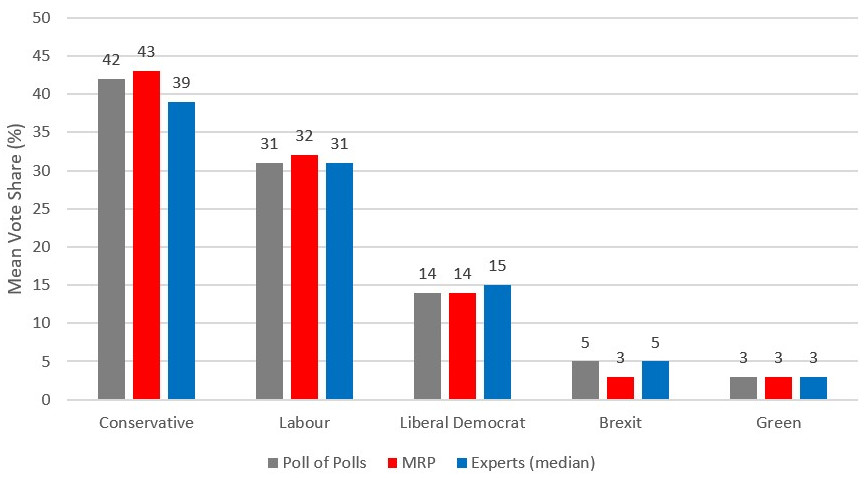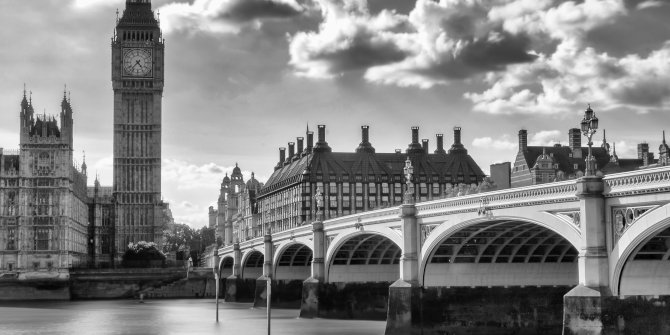 There are many ways to estimate the likely outcome of an election, from projections and models based on polls to citizen forecasts. Another approach is to survey experts for their predictions and, writes Joe Greenwood, the Political Studies Association recently did just that in relation to the general election. Moving beyond the current polling figures, the experts anticipate a close result, and are divided over whether the Conservatives will achieve a majority. They also predict Labour falling short of their 2017 seats but not as dramatically as polling suggests.
There are many ways to estimate the likely outcome of an election, from projections and models based on polls to citizen forecasts. Another approach is to survey experts for their predictions and, writes Joe Greenwood, the Political Studies Association recently did just that in relation to the general election. Moving beyond the current polling figures, the experts anticipate a close result, and are divided over whether the Conservatives will achieve a majority. They also predict Labour falling short of their 2017 seats but not as dramatically as polling suggests.
Besides the wall-to-wall coverage, the soundbites, and the floods of campaign materials, the general election also produces a glut of public opinion polls. Rarely is there a time when we hear more about what the public thinks or how they intend to behave, and with good reason: elections provide the public with an opportunity to shape the future of the country, so it is important to understand their thinking in the run up to election day. However, beyond the standard polls and more complex approaches such as MRP models, there are other ways to estimate the likely outcomes of an election. One such approach is citizen forecasts, in which survey researchers ask a sample of the public what they think the outcome of the election will be rather than simply how they intend to vote. Another, related approach is to ask for the predictions of small, sometime maligned, subset of the population: experts.
Expert surveys are a well-established way to investigate politics, for instance via the Chapel Hill Expert Survey, which asks academics about the ideological placements of parties in a range of countries. Indeed, the British Election Study is currently undertaking a similar exercise to assess the placement of British parties on a range of policy issues. In this vein, between 20 November and 2 December, the Political Studies Association (PSA) ran a survey asking experts for their election predictions. The resulting data was analysed by Stephen Fisher, Martha Kirby, and myself, with the full report available via the PSA’s website, and some interesting findings emerge.
The online survey was sent to academics (PSA members specifically), pollsters, and journalists via email, and received 191 responses with answers to all the questions of interest. Specifically, the experts were asked to predict the vote shares of the UK-wide parties and of the parties specific to the nations of the United Kingdom within those nations. They were then asked to predict the number of seats that each party will win in the House of Commons, the probability of a Conservative landslide, and the likely turnout in the election. The two figures below show their predicted vote share for the GB-wide parties and the seats expected to be won by the parties standing in England, Scotland, and Wales. In the vote share figure, the expert survey predictions sit alongside YouGov’s MRP model estimates and the average figures from the standard polls, both from the latter part of the period when the expert survey was collecting responses. In the seats figure, the adjacent columns are from the MRP model and the application of uniform change to the average polling figures.
Figure 1: Predicted vote shares in the 2019 UK general election (poll of polls, MRP model, PSA expert survey)
Source: Compiled by the author.
Figure 2: Predicted seats in the 2019 UK general election (uniform swing, MRP model, PSA expert survey)
Source: Compiled by the author.
The expert predictions should be different from the polling-based estimating because the experts were asked to consider what will happen on election day, whereas the polls are a snapshot of public opinion at the time they were gathered. It seems that the experts are sceptical about the Conservatives maintaining their strong position in the polls, predicting that they will fall to a 39% vote share (median answer) on 12 December. They do not anticipate a concomitant rise in Labour vote share, and anticipate that the party has hit a peak (31%) and will remain at that level in voting on Thursday. Finally, their predictions for the Liberal Democrat, Brexit Party, and Green vote shares are very close to the polling figures at the time of the survey.
The experts’ scepticism regarding the Conservative Party’s ability to maintain its performance until election day is also reflected in a divide over whether they will win a majority of seats. The median number of seats predicted for the party is 326, which is much lower than what the polling figures at the time indicated (in excess of 350), and slightly fewer than half of the experts predict that the Conservatives will fall short of a majority. The main beneficiaries of the decline in Conservative support would be Labour and the Liberal Democrats. In the former case, the experts predict that they will hold onto a significant number of marginals, whereas the polling at the time indicated that these would fall to the Conservatives. They also anticipate that the Liberal Democrats will somewhat sidestep the curse of being the third party in a first-past-the-post system, with 23 seats (10 higher than the MRP model and 3 higher than uniform change based on the polls at the time). As with vote share, they predict seats for the Brexit Party, Greens, SNP, and Plaid Cymru in line with the polls at the time. Their vote share and seat predictions are also reflected in the low probability (19%) that they give to a Conservative majority exceeding 100, whilst they anticipate a fall in turnout to 66%.
The expert respondents to the PSA’s survey expect Thursday to result in a Conservative victory but not necessarily a majority for them in the House of Commons, and this would be something of a bitter pill for the party to swallow. Although they would see an increase in their seats from 2017, their support would have declined in the last few days of the campaign and they may fall short of their ultimate goal in this election. It would also be a difficult night for Labour, who would fail to reach their vote share or number of seats from 2017, though they might be able to take solace from once again seeing the Conservatives fail to obtain their objective. The Liberal Democrats would no-doubt be delighted with their increased number of seats, as would the SNP, with Plaid Cymru content to maintain their seats, the Greens happy to double theirs, and the Brexit Party very pleased to buck their expected decline into parliamentary irrelevance.
This cautious prediction of no majority or a very small majority for the Conservatives by the experts may reflect lessons learnt from 2017, when the hung parliament surprised many. If the experts are right then 2019 may be a slightly less dramatic, but surprising nonetheless, rerun of 2017, and we are now only a matter of days from finding out.
Please read our comments policy before commenting.
Note: This article first appeared on our sister site, British Politics and Policy at LSE. It gives the views of the author, not the position of EUROPP – European Politics and Policy or the London School of Economics. Featured image credit: Arran Bee (CC BY 2.0)
_________________________________
 Joe Greenwood – LSE
Joe Greenwood – LSE
Joe Greenwood is an LSE Fellow in the Department of Government, where he teaches on GV101 (Introduction to Political Science). He previously worked at YouGov and, before that, completed his PhD at the University of Essex. His research focuses on political participation, privilege, and perceptions in the British context. He tweets @niceonecombo




